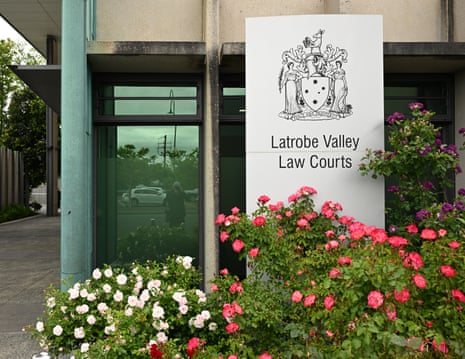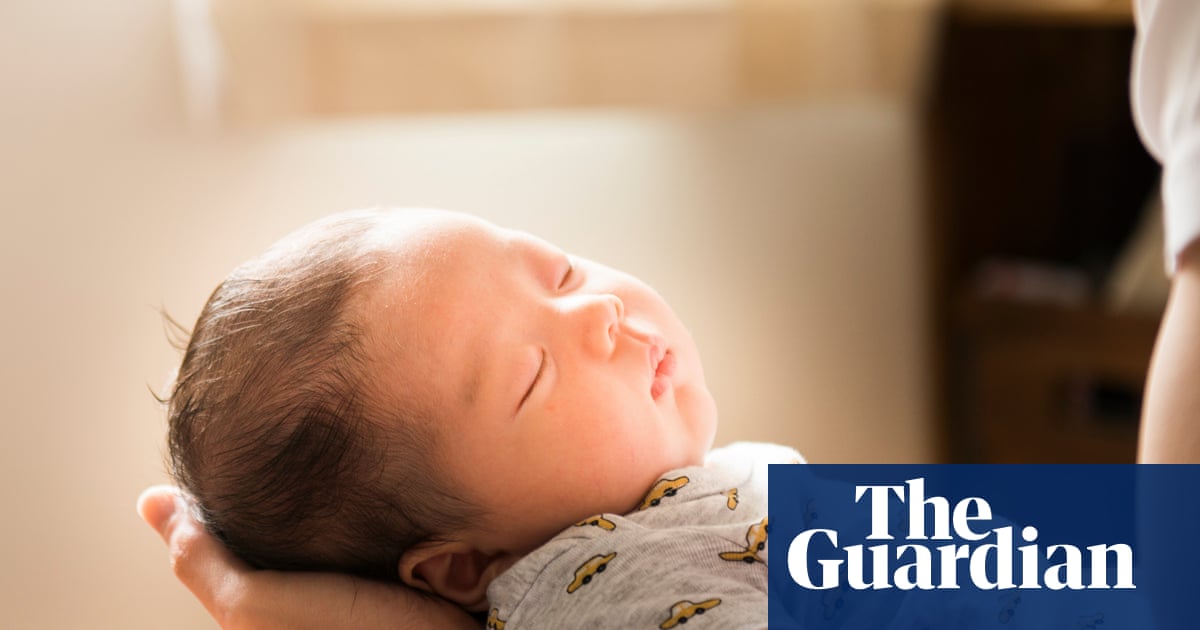Key events Show key events only Please turn on JavaScript to use this feature
'Good character' evidence
Beale turns to the “good character” evidence in the case.
He says the jury has heard evidence from a range of family and friends who said Patterson was a devoted mother and good daughter-in-law.
Simon told the court Patterson was a devoted mother and got along well with his parents, Beale says.
He reminds the jury of evidence from Patterson’s online friend Daniela Barkley who said “I thought she was a wonderful mother”.
Another online friend Jenny Hay said Patterson’s life revolved around her children and she was an attentive and devoted mother.
Patterson also had no criminal history, Beale says.
He says if the jury accepts Patterson is of good character they can use it to assess her credibility.
“You may be less willing to accept the prosecution’s evidence than if she was not a person of good character,” he says.
“You can use it to determine the likelihood she committed the offences.
“Of course, this does not mean that you must find her not guilty if you accept she was a person of good character.”
He says being of good character cannot alter facts.
“You should keep in mind that a person who was previously of good character can commit a crime,” he says.
Patterson does not need to prove her innocence
Beale turns to Patterson’s evidence. He says Patterson had no obligation to give evidence in her trial.
He says Patterson does not need to prove her innocence.
Beale tells the jury:
- If jurors find Patterson’s evidence true they must find her not guilty of the four charges
- If jurors are not sure about Patterson’s evidence they would have reasonable doubt and must find her not guilty of the four charges
- “It’s not enough that you prefer the prosecution case to Ms Patterson’s evidence,” he says.
He says if they do not believe Patterson’s evidence they can put her testimony aside. But they still need to determine if the prosecution has proved it beyond reasonable doubt on the remaining evidence.
Beale touches on the evidence by Patterson’s children and things to consider.
The jury was played pre-recorded video evidence from the two children, who cannot be named due to a suppression order.
He says the jury should consider that children’s language and mental skills can influence how they respond to and answer questions.
A child’s level of development can also determine if they can understand certain concepts, the court hears. Beale says children often have difficulty with concepts involving comparing two things.
The jury should also consider that a child may not ask for clarity if they misunderstand a question.
Jury must 'cast aside any sympathies or prejudices'
Beale says the jury must cast aside any sympathies or prejudices for people involved in the case.
He says the issue is not if Patterson’s meal caused the fatal consequences but if the prosecution has proved beyond reasonable doubt that she is “criminally responsible” for the consequences.
“The fact Patterson told lies must not cause you to be prejudiced against her,” he says.
He says while “any reasonable person would feel great sympathy” for the Patterson and Wilkinson families, jurors must not be swayed by emotions.
The jury can only consider the evidence presented in the court room, Beale says.
“This case has attracted unprecedented media attention and excited much public comment. If any of that has reached your eyes or ears or does so in the coming days ... you must be particularly careful not to let it influence you in any way.”
Beale says if jurors overhear their family or friends express an opinion about the case, they must ignore this.
He says only the jurors have sat in the jury box throughout the trial and heard all the evidence.
“You and you alone are best placed to determine whether the prosecution have proved their case beyond reasonable doubt,” he says.

Beale says it is the jury who will decide if Patterson is guilty or not guilty of the three murder charges and one attempted murder charge.
“You do that by deciding what the facts are in this case,” he says.
“You, alone, are judges of the facts in this case.”
He says jurors must apply the law to the facts to determine if Patterson is guilty or not guilty of the charges.
Jurors do not need to accept the arguments of the prosecution or defence.
“If you do not agree with their view, just put it aside,” he says.
Jurors given 86-page document
Beale has given the jurors an 86-page chronology of exhibits and evidence presented in the trial.
He says it is”not homework” but a document the jury can dip into it during their deliberations.
“It’s probably best to leave it in the jury room to consult,” he says.
The document contains evidence that dates back to 2007.
Jurors are 'judges of the facts'
Beale says his charge will include three sections – the principles of the law, issues to consider and the procedure they must follow.
He says jurors are the “judges of the facts.” Beale says this means if he omits evidence in his summary it does not mean it is not important.
The jurors can determine which arguments have merit regardless of if he mentions it, Beale says.
He reminds the 14-person jury that only 12 will determine the verdicts in Patterson’s trial. A balloting off process will determine which jurors deliberate.
The jurors have entered the court room in Morwell.
Beale is delivering his instructions to the jury, which is called the judge’s charge.
What the jury heard last time
Here’s a recap of what the jury heard when the court last sat on Thursday:
-
Patterson’s defence lawyer, Colin Mandy SC, outlined the prosecution’s top four “convoluted” and “absurd” propositions. Mandy said these were Patterson committing murder without a motive, lying about cancer to entice her lunch guests over, expecting her lunch guests to take her medical issues claim to their graves and thinking she could pass off the lethal meal as a “strange case of gastro”.
-
Patterson’s estranged husband, Simon, accusing her of using a dehydrator to poison his parents on 1 August 2023 – three days after the lunch – was a “turning point” for the accused, Mandy said. He said this was when his client began to panic and lie. Simon denied saying this to Patterson when he testified.
-
Mandy refuted the prosecution’s phone argument. He said Patterson would have either disposed of or reset her original mobile – Phone A – if she had planned the “cold, calculated murders” claimed by the prosecution, but instead she continued using it after the lunch.
-
Mandy pointed to Patterson’s medical tests results from two days after the lunch as evidence she became unwell from the beef wellington meal. He pointed to her low potassium, elevated hemoglobin level and elevated fibrinogen, which he said did not rely on self-reports.
Welcome to day 36 of Erin Patterson’s triple murder trial.
We’re expecting the trial to resume from 10.30am.
Justice Christopher Beale will begin instructing the jurors this morning before they begin their deliberations. The jury will not retire to consider its verdict until Wednesday at the earliest.
Patterson, 50, faces three charges of murder and one charge of attempted murder relating to a beef wellington lunch she served at her house in Leongatha, in regional Victoria, on 29 July 2023.
She is accused of murdering her in-laws, Don and Gail Patterson, and her estranged husband’s aunt, Heather Wilkinson. The attempted murder charge relates to Heather’s husband, Ian.
She has pleaded not guilty to the charges.
The prosecution alleges Patterson deliberately poisoned her lunch guests with “murderous intent” but her lawyers say the poisoning was a tragic accident.

 2 months ago
64
2 months ago
64

















































